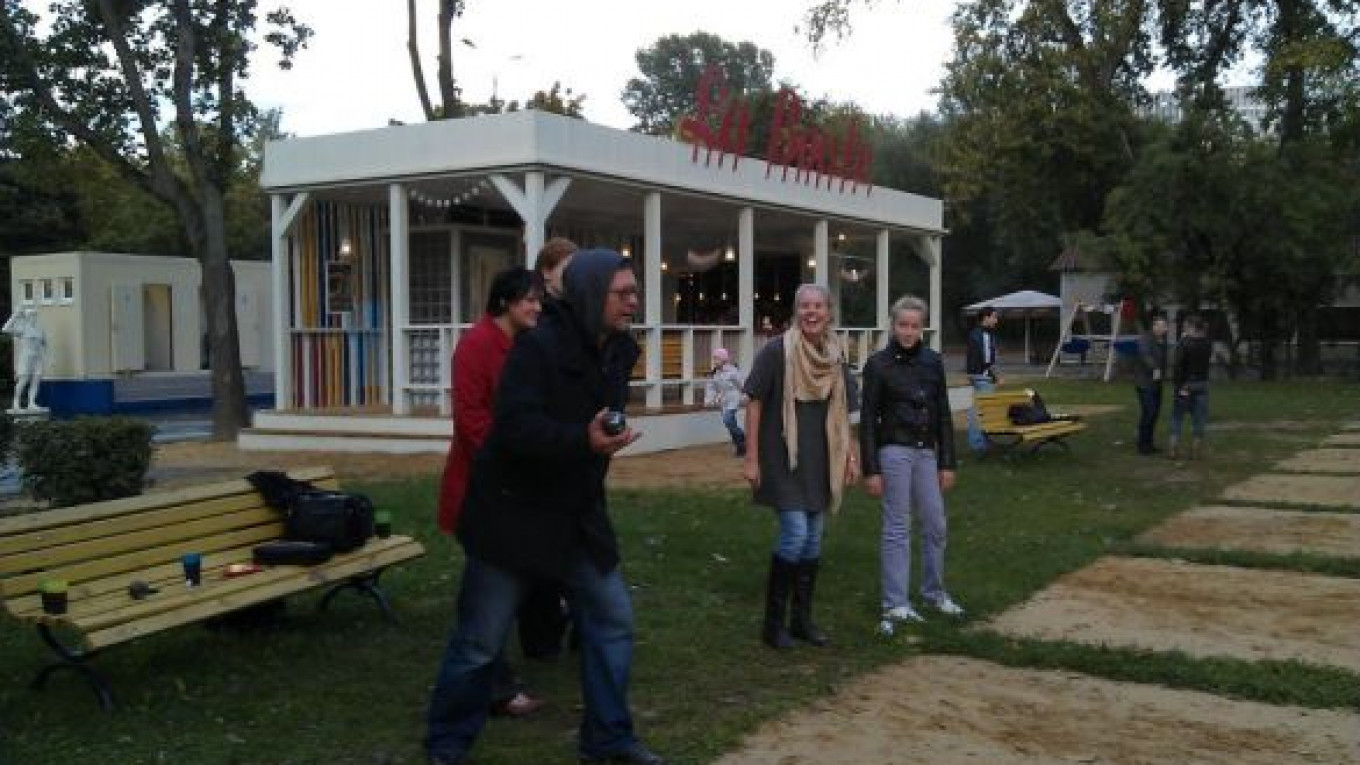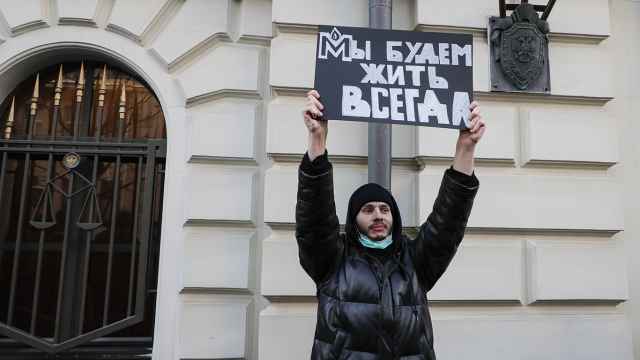Springing from her desk, Blanche Neumann, the petite managing director of Moscow-based Fetish Film, leaps forward from her desk and frenetically engages her team members, organizing their activities to achieve the immediate task.
Neumann is visibly overflowing with energy, which she devotes to developing others' dreams.
"For me, life is boring if energy only moves in one direction," she said.
Education
1993-1996 — FAMU, Czech Film School, Prague
1996-1997 — FEMIS, French Film School, Paris
Work Experience
1996-1997 — Clap Girl, On-Set Translator, Production Assistant
1997-2003 — Sirena Film, producing feature films, short films, advertising and music videos
1997-2003 — Artcom Distribution, acquiring films and distributing festival and art-house films
2003-Present — Fetish Film, Founder and Managing Director Fetish Film regularly wins awards at international film festivals, including the Grand Crystal at the 2008 Meribel Ad Festival and first place for Television and Film Advertisements at the 2010 Moscow International Advertising and Marketing Festival Red Apple.
Favorite books: “The Big Sleep” (1939) by Raymond Chandler and “Master and Margarita” by Mikhail Bulgakov
Reading now: “Ground Up” by Mikhail Idov
Movie pick: “Love in the Afternoon” (1957) directed by Billy Wilder
Favorite Moscow restaurant: Either my friend’s or my kitchen
Favorite weekend getaway: My friend Sasha’s dacha in Tarusa.
Neumann, 36, has infused projects with her abundant enthusiasm, producing internationally renowned commercials, developing award-winning directors and, most recently, opening a restaurant in Gorky Park that includes a field for petanque — a game similar to bacci and lawn bowling.
Founding Fetish Film in 2004, the half-Czech, half-French producer maneuvered through turbulent years to develop a team of eight professionals, producing 20 to 25 projects each year with budgets of up to $1 million.
Priding itself on its creativity and innovation, the production agency won the Grand Crystal at the 2008 Meribel Ad Festival. The winning ad campaign, designed for the Russian Association of Motor Insurers and the traffic police, violently portrays the realities of reckless driving.
"Buckle up!" displays a father, Vasily, leaving for work, kissing his family goodbye, then leaping from his fifth floor apartment to hit the ground at 50 kilometers per hour. This image is juxtaposed with Vasily in a car accident at 50 kilometers per hour wearing a seatbelt.
Citing the lifelike violence, state television stations refused to air the commercial in 2009. Consequently, Vremya Novostei published an article criticizing the stations for the arbitrary nature of their morals.
Undeterred by the incident, Fetish Film continued to win accolades taking first place for Television and Film Advertisements at the 2010 Red Apple in Moscow.
Blanche, however, shrugs when speaking of these awards. "In Russia, unfortunately, awards don't do anything. It is more about the relationships."
It is one of many lessons Neumann has learned during her experience as a female business owner in Russia.
Feeling bored in Prague, she moved to Moscow in 2003, where she found the challenge she had been searching for.
In the first year, she worked 16 to 18 hours a day, taught herself accounting and recovered after her business partners walked out with a number of her clients.
Speaking of the near collapse of her business, Neumann found the silver lining. "When they left, they took clients, and I had to reopen everything, but actually I am very grateful that they did that. What doesn't kill you only makes you stronger, so it actually made me and the company stronger in the sense that I learned from it, and it helped me find much better people than the ones I had been working with."
Starting over from scratch and linking up with a like-minded Russian partner, Tatyana Aldyn-Kherel, Neumann remained optimistic.
Finding that right person "is about right time, right place, being curious about people and trusting your inner voice."
Blanche employs her optimism to develop other members in her field.
"The role of a producer is to pass on their energy to someone in order to create a project.
If the person does not have enough ambition, I encourage them to go further and give them more freedom. We are always looking for new talent within Russia among new and up-and-coming directors. In fact one of these directors, Mikhail Lokshin won second place at the Young Director Award 2011."
Beyond the film business, Neumann has started to share her energy with the entire Moscow community by partnering with her friend, Dasha Zoritch, to open La Boule in Gorky Park. The restaurant with 11 petanque fields has been a hit, bringing together all ages and nationalities — Russian, French, Swiss, American, Canadian, Georgian — to play the game, rain or shine.
Q: Why did you first come to Russia?
A: I was working in Prague for six years at Sirena Film and Artcam Distribution producing advertisements, music videos and feature films. It was a pretty eclectic mix; however, I was at a point where I felt bored. I wasn't being challenged. I already had it in my head that I would change cities.
Then in 2003, an agency here in Moscow, Ark-JWT, for which we had done four jobs, advised my partner and I to move to Moscow. They had liked our collaboration, and we knew the creative director pretty well. After getting to know this market, we thought why not.
Q: What has it been like as a woman managing your own enterprise in Russia?
A: It isn't easy for a woman to manage a company with two other men as partners. With freelancers it works very well. We work quite a lot with free-lance production managers, set designers, with directors of photography there is no problem. But in the everyday office the relationship is completely different because you see each other five days a week. It is difficult for them to accept comments that can appear critical. Especially when you are 1 meter, 55 centimeters and have a temper, which I think I have. It is not easy.
Q: Why have you decided to live in Moscow for so long?
A: I have a very mixed culture from my mother who is from the south of France and has Italian roots, my father who is Czech, and I traveled a lot in Germany and throughout Europe. I have a type of gypsy taste with Arabic influences. Part of my family was living in Algeria. I don't feel linked to one city. In terms of tastes in design or food, I would say a gypsy goulash with red wine, coconut milk and a hint of ginger.
And Moscow is quite gypsy actually. For me, Paris, St. Petersburg or Prague even, though I love them, they are too uniform, too perfect. Moscow is a city that deeply touches me because she is big, beautiful and ugly — a bit handicapped.
With a crumbling worker's building beside a church, beside a big building from the '70s and some amazing car — that kind of chaos. I completely understand that others find it noisy, dirty, sad, unorganized, but for me it is perfect.
Q: What is your philosophy as a producer?
A: The role of a producer is to pass on energy to someone in order to create a project. I talk about belief a lot because the job is all about belief, trust and a common conception of what the project will look like. The job is all about believing because most of the work we do is not valuable in terms of money. There are markup rates and salaries, but overall what we sell is what [a project] will look like. But producing is always about projection and what this common idea will look like. It is a lot about imagination.
Q: What were your thoughts after the state television stations refused to air your commercial?
A: It is a pity and completely paradoxical because, especially at that time, you saw such vulgarity in the broadcasts and films, and you don't understand why that's more violent or shocking than what they put on television. It's absurd, but it is just one of the many absurdities that you find in Russia.
Q: Have you seen other strange restrictions in the media?
A: There is one big restriction with beer. You can do commercials with beer, but you cannot show any living creature — either animal or human. So all the agencies are breaking their heads to imagine some abstract campaign with only still objects. It is kind of challenging for them to renew themselves; it has been that way for three to four years. Basically, you show the product and inanimate objects.
Q: Have you seen any changes in the industry?
A: After or during the financial crisis, clients became frightened of creativity and moved back to a much more classical form of communication. And I think we still feel the effects of that. It broke the desire for creative pieces. I think it was better before 2008 in terms of the number of creative orders we received. They went back to classical ideas such as happy families … designs that were very cliche.
Q: What has it been like working with Russians?
A: Now I have such a great team, but of course to reach to this point you meet a lot of people who are just not mature enough. There's a problem here with responsibility and maturity. Either people get mature very fast or they are children.
I think that Russia is a country of contrasts. Either you are extremely lucky and you find the most trustworthy, hardworking and intelligent person and you grow quickly, or you find the complete opposite: people who overevaluate themselves, who are constantly disappearing on sick leave. It is very seldom that you find someone average — it was always either a pleasant surprise or a catastrophe.
After three years I found Tanya, who is still our partner. We complement each other very well.
Q: What has been the most difficult aspect of starting your own business in Russia?
A: I had learned Russian in College, but I hadn't spoke for 10 years, so it was a complete mess. I was taking Czech and putting endings on it like -ых or -ов to make it sound Russian. No one, except two of my colleagues who I had hired and a few people in the advertisement agency, knew any English. So I would explain something to the film crews and they would barely understand me, then they would explain something to me, and I would barely understand them. It was like a jump in ice-cold water.
Then my partners left. It is really cliche — you say bye to someone Dec. 26 to go home and celebrate the holidays with your family, and then on Dec. 27 you receive an e-mail. Something like "after a long reflection, we think it is better to split," with a lot of mistakes in English. They took the clients, and I had to reopen everything. But actually I am very grateful that they did that. They were feeling uncomfortable, and I was too, just not as radically, so it is good that we split — it is just the way they did it. Now I just laugh about it.
Q: How do you keep yourself challenged?
A: If you are in a period that is less productive in terms of creativity, you can add extra work where you develop and help talent you believe in and respect. Producing music videos or short films with a small budget tests your working relationship with people you believe in and, most of the time, it works. You go into the unknown and have to improvise due to budget difficulties, but it's never occurred that we say 'oh we regret it.' It works on enthusiasm and mutual trust.
Q: What advice can you give to others to find their 'Tanya'?
A: I think it's about right time, right place. Be curious about people and trust your inner voice or your instinct.
A Message from The Moscow Times:
Dear readers,
We are facing unprecedented challenges. Russia's Prosecutor General's Office has designated The Moscow Times as an "undesirable" organization, criminalizing our work and putting our staff at risk of prosecution. This follows our earlier unjust labeling as a "foreign agent."
These actions are direct attempts to silence independent journalism in Russia. The authorities claim our work "discredits the decisions of the Russian leadership." We see things differently: we strive to provide accurate, unbiased reporting on Russia.
We, the journalists of The Moscow Times, refuse to be silenced. But to continue our work, we need your help.
Your support, no matter how small, makes a world of difference. If you can, please support us monthly starting from just $2. It's quick to set up, and every contribution makes a significant impact.
By supporting The Moscow Times, you're defending open, independent journalism in the face of repression. Thank you for standing with us.
Remind me later.






